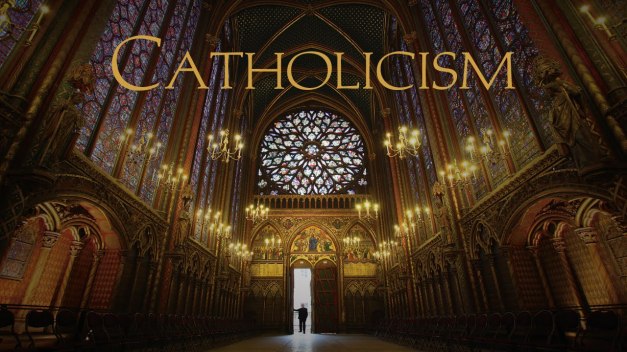Is Jesus Christ Really God Himself Incarnate?
By Rock Tennie
All my life, I always believed that Jesus Christ was the son of God. Two years ago, I was told something different. I was told that Jesus wasn’t merely the son of God the way I think of a father and son…but that Jesus Christ was God himself in the flesh, that Jesus Christ and God are the same person.
In this essay…I’m going to break down my pursuit of the truth. And mind you, everything I’m about to reveal is just my interpretation of the scriptures. I could very well be wrong. However, as a Christian, I believe it’s my responsibility to learn and make a decision about what I believe is the truth. Thus, when I stand before God, it won’t be with this indifferent attitude of “…well, I heard this and that…But I’m not sure what I believe.”
On that note…before you begin, I encourage you to pray. Remember, it’s by the grace of God that we receive our understanding.
Just to give you a little background about who I am. I’m a black 33-year-old Christian Conservative born and raised here in the States. I’ve never been to any Christian College or Theocratic School. I’m not a member of any church or congregation. I have no denomination. That isn’t to slight organized religions. I know God loves assemblies. I’m just a man who decided to pick up the Bible and read it cover to cover. To learn for myself why things are the way they are? How did it come to this? Is there any hope? What should I do? What is right? What is wrong?
So why am I questioning who Jesus Christ really was?
Because of a Lutheran.
Haha, so…at the age of 30 (in 2017) and having already read the Bible once in its entirety, I made up my mind to find a wife, a woman who also endeavors to do what’s good in God’s eyes. That’s easier said than done in today’s woke secular culture, unless you’re part of a congregation. I am not.
I attend the Jehovah’s Witnesses Memorial every year, but I couldn’t attend their meetings on a regular basis because it reminded me of the turmoil of my youth. They study these articles in magazines called “Watchtowers,” where a lot of the substance is about how to be a better Jehovah Witness. Since I’m not a witness, I felt like an outsider. Alone, despite surrounded by others.
Not to mention, I’m very self-aware. Even if I joined a new congregation, I’d go to their church to worship God, sure…but it’d be impossible to ignore my own ulterior motives, that is to find a beautiful mate. I had already been called a creep and accused of sexual harassment in my 20s through misunderstandings (and a straight-up malicious assault on my character), but in this case, I fear it really would have been creepy. Like a hawk on a perch, looking over the congregation for available pretty women. I’ve been told this is what other men do…but still…once you’re accused of being called a creep, it has a way of hindering such boldness.
I needed to join a congregation where my mind was focused, not on women, but on the theocratic message at hand. But which congregation? What church? There are churches and congregations everywhere. So many different types of Christianity. Like kung fu, different beliefs of the same core religion.
Then…it was just by chance that I came across a Netflix documentary about the reformer, Martin Luther…

Martin Luther was a German professor who was ordained as a priest…but eventually rejected several practices by the Roman Catholic Church, such as indulgences, a written document that people could buy from the church to absolve them of a particular sin.
Back then, the scriptures were mostly written in Greek and Hebrew, so anyone who didn’t understand the language mostly had to rely on the priests to tell them what was written in the Bible. Luther, however, could read it. He challenged the pope’s authority and thanks to him, the Bible was translated so the common people could read it.
It led to a widespread reformation that changed the face of the entire European continent. Huge debates broke out throughout the land and Christianity was split from Catholics to people who protested against it…hence Protestants. In fact, one could argue that all forms of Christianity that didn’t conform to the Catholic teachings are some form of Protestantism, including Lutheranism, Methodists, Calvinists, Baptists, and even Jehovah’s Witnesses.
Martin Luther…I dare say, reminded me of myself in questioning the practices and ideology of my own religion. So I sought out a local Lutheran pastor to talk about him and gain greater insight.
It was on a Sunday afternoon, and for four hours at a Starbucks, I spoke with a young Lutheran pastor who had to have been in his late 30s, white, married, with three daughters. It was a lively discussion where we agreed on so much and he even was kind enough to help me understand the nuances of Lutheranism, giving me Martin Luther’s autobiography to read.
But it was here…during this discussion that he mentioned something that set me on a three-year journey…
He told me that Jesus Christ was God himself.
I was like, “He’s the son of God. Not God himself.”
He was like…“No, Jesus was God in the flesh.”
He used his Bible to take me to John Chapter 1, where it reads, “In the beginning was the Word, and the Word was with God, and the Word was God.”
He said that the Word referred to Jesus Christ. Thus…Jesus Christ was God.
This blew my mind. It’s a scary notion. This whole time, my entire life, when I read that Jesus Christ was the Son of God…I literally thought of it as, “well…I have a father. I’m my father’s son. It’s the same with Jesus. Jesus is Jehovah’s son. Just like I am not my father, Jesus is not Jehovah.”
Was I wrong this whole time? I couldn’t ignore a mystery this big.
Why this is Important?
In the New Testament, Jesus says all who accept him will be saved. This whole time, I thought he meant that all who repented, accepting him as the Son of God who died for our sins. But what if he meant, “all who accept that I am God”?
If Jesus Christ is God himself and I don’t accept that he, or I don’t believe it, am I really accepting Christ? I think that would be really bad.
However, if Jehovah (the Father) is God and Jesus Christ is a separate entity, and yet I put Jesus on the same footing as Jehovah himself…I thought this would be disrespectful as well. I had choices I had to make. I had to investigate.
Out of all the Bible Books, the Book of John is perhaps the most spiritual in asserting Jesus Christ’s divinity as God himself. I knew that going in. So I prayed for wisdom and understanding. I asked that He softened my heart that I may know the truth. If I was wrong and what I believed my whole life was inaccurate, I prayed for the strength to accept it and embrace the truth.
This isn’t easy. The pursuit of the truth. It sounds all virtuous and admirable, but it’s a harrowing feat. I’ve been in so many debates where people have said, “Yeah! Well! If you were born a Muslim, you’d reject Christianity even if you learned about it, because you were taught Islam your whole life! It’s about loyalty to the God you know.”

It’s a difficult argument to counter. Thankfully, God understands this. Romans Chapter 14 teaches us that we’ll be judged by our own convictions as individuals. Jehovah knows our hearts. It is my personal belief that God’s not gonna be like, “Oh, you thought Jesus Christ died on a cross?! Nope. He actually died on a stake. You got that wrong, so you’re out!”
If God sees us actively seeking the truth with earnest intentions to draw closer to Him, I don’t believe he’ll judge us so harshly even if we’re mistaken about the details, so long as we get the essential message. It’s like taking a leap into an abyss, called faith. I believe whether I am right or wrong, God won’t let me die when he sees the honest and virtuous intentions.
With this in mind, the anxiety and trepidation is quelled a bit as I opened my heart to handle these “Interpretative Challenges”…and to face the fact that I may be wrong.
What I’ve Concluded and Why:
I believe that there is only one God. Christianity is a monotheistic religion. Jesus Christ and Jehovah are separate entities. God’s name is Jehovah in English, Yahweh in the Hebrew language. There have been other titles to describe him such as Jah, the Grand Creator, or El Shaddai (God Almighty). But as an English speaker, I refer to him by his name of Jehovah.
I believe Jesus Christ is the son of God, the first being God ever created when he said “Let there be Light”. (John 3:19, Gen 1: 3) Thus, Jesus Christ is a separate entity. I believe that Jesus Christ was with Jehovah from the very beginning. Jesus was there with God when all things were created. Thus, Jesus has the most intimate knowledge of God than anyone else that ever existed. Before Jesus came to us in the flesh, he was in heaven with God. Some say he was an angel, some say he was the Archangel, Michael. What I know is that he is Jesus.

In that essence, it makes sense to read rhetoric like in John 14 when he explains to his disciples in verse 7, “if you had known me, then you know my Father, also. From now on you do know him and have seen him.” The rest of that chapter make a strong case of Jehovah and Jesus being one in the same. I get it. However, the issue is that I’ve seen far more scriptures to support the idea that Jesus Christ will be sitting at the right hand of God, implying two separate persons. I’ve seen too many scriptures where Jesus and his disciples had the opportunity to blatantly and distinctly confirm that Jesus Christ was God himself in the flesh, but on almost every occasion, they refer to him as the Son of God.
I believe in the infinite wisdom and intelligence of Jehovah. With that in mind, one has to wonder, “if Jesus truly was God himself incarnate, why didn’t he ever come out and say that? If he was truly God himself incarnate, why did he constantly refer to himself as the Son of God?”
We know that Jesus loves to minister in parables, but he always explained those parables to his Apostles, which we have the benefit of reading about through the Bible. Thus, after years of reflection and prayer, I believe the rhetoric such as where Jesus says, “Whoever has seen me has seen the Father,” it’s an affectionate figure of speech illustrating how close and united Jehovah and Jesus Christ are.
Semantics. That’s the key. In the Book of John and other books, Jesus explains emphatically that he and Jehovah are of one accord. Like perfect teammates who have the same goal, same personality, same wants and desires and think the same way. But always, Jesus’s will is to obey his Father.
I believe that next to Jehovah himself, Jesus Christ is the most powerful entity in existence. He’s been given authority in almost all matters such as knowing what’s in a man’s heart, what he’s thinking, resurrecting others, power over the elements like the wind and sea, healing and much more. However, he is limited in other matters, such as the time in which Jehovah will cause heaven and earth to pass away. (Matt 24:36).
In believing Jesus Christ is so powerful, it led to me writing this previously unpublished rant about us undeserving human beings:
“I had to share a bit of resentment I’m starting to have towards this world. Because in learning about Jesus, I mean really getting into the details of who he was and what he’s been through…it stirs up that rage in my heart when it comes to an injustice met out on the innocent. Whether it’s Emmitt Till or the countless children kidnapped and murdered throughout the country, or women sold into the sex trade of Vegas. But unlike those innocent children, Jesus was something quite remarkable.
Imagine if you had the ability to instantly cause your would-be killer to burst into a million pieces…but you didn’t. You let your killer kill you because it was what God…this might be a terrible analogy.
Jesus didn’t come to receive the glory of humans, he came only to please God. He comes in God’s name, so people rejected him. But if he came in his own name, like Alexander the Great, they’d accept him. This is due to their own wicked hearts. I believe humans have a tendency to admire those who are doing what they wish they could. Meaning, if a person can fly, we admire that person because we wish we could do it. If a person robs a bank and gets away with it, a wicked person would admire the robber because he/she wishes they could do it.
In Jesus’s day, they expected the Messiah to come as a political or military power to aid them against the imperial Romans. But because Jesus came to do God’s will and not theirs, they rejected him. This is the same for many today who reject the Bible because it doesn’t conform to what they want. They want Christ teachings to conform to their lives, instead of conforming their lives to Christ’s teachings.
The most powerful thing I’ve come to learn in grasping who the Lord Jesus Christ is…is that at any time, he could have obliterated his annoying enemies. They were annoying. Not devastating. Not formidable. Just annoying. Because Jesus had the power of God, Jehovah of Armies. He had the power to resurrect. To cast judgment. He helped God create everything just by speaking the words. At any time, he could have turn his enemies to dust. The Roman scourging him with a whip? He could have burned him alive in an instant. The crowd of Jews spitting and beating on him in the crowd, Jesus could have unleashed a pride of lions to tear them apart much like the bears who mauled 42-children who were antagonizing Elisha (2 Kings 2: 23-25).
Instead…Jesus endured and put up with us human beings. He led by example to show us what love is, washing the feet of his own disciples. This is what makes him great. Sacrificial love. Possessing the power to dominate and control everything in sight, yet, defers to love and compassion to heal and encourage, to try to save the hand that’s slapping you in the face….
I strive to be more like that because, I confess, one thing I struggle with is a lack of compassion towards people who keep making the same mistakes. Or those who squander their blessings while I’ve busted my ass to be responsible and work hard, and now I have to help them. It’s true. I resent them. I wish I didn’t. But I do. I am walking towards the light. I don’t reject the light. But it’s tough.
It’s not about race, gender, or ethnicity. All of us are capable of receiving God’s love and grace.
I could have easily rejected it like so many others in favor of all the sex and money I ever wanted. But my conscience wouldn’t allow it. I knew what was right and wrong and I don’t ignore the shame. I embrace it, acknowledge it, and adjust to stay on the right path. You can too. Right?”
One change I have come to accept, which was different from my first time reading the Bible, is that it’s okay to view Jesus and Jehovah as equals. John Chapter 5 is a good chapter to read about that. John 5:18 and John 5:23 explicitly have Jesus putting himself on equal footing with Jehovah. Still…Jesus will be at God’s right hand side. But Verse 23 says that “all may honor the Son, just as they honor the father”.
This was, I confess, a bit difficult to swallow. But I accepted it. I have to. It’s what Jesus Christ himself said according to the Apostle John.
And to dismiss this as truth…would make me no better than the Feminists who want to disregard Paul’s letter to Timothy about wives submitting to their husbands (1st Timothy 2: 11-15). I don’t believe in picking and choosing what I want from the Bible just to serve my agenda. That is one of the greatest follies as Christians and pastors throughout history have used it to their advantage. Another reason why I encourage the personal responsibility of reading the Bible for yourself, instead of relying on hearsay.
What I Don’t Believe and Why:
I do not believe that Jesus Christ was God himself incarnate. At anytime, Jesus Christ could have plainly stated that he was God himself but never did. Instead, he continuously referred to himself as the Son of God, the Son of Man, the one who will be sitting at the right hand of God, among other titles. (Acts 7:55–56; Romans 8:34; Ephesians 1:20; Colossians 3:1; Hebrews 1:3;)
In the garden of Gethsemane and even on the cross, he speaks to Jehovah, another person. This is perhaps the strongest evidence I found that really supports my belief that they are two separate entities. In Matthew 26:36-46, Jesus is in the Garden of Gethsemane on the same night he was betrayed into the hands of the Jews, and Jesus says, “My Father, if it is possible, let this cup pass from Me; yet not as I will, but as You will.”

In John 17: 2, Jesus prayed to God and said, “Father, the hour has come, glorify your Son that the Son may glorify you, since you have given him authority over all flesh, to give eternal life to all whom you have given him.”
Again, I may be wrong. It may very well be that God has denied me sight of the truth. But from what I’ve read, what this tells me is that Jesus is talking to another person. Jesus is talking to our Heavenly Father. He’s talking to Jehovah. In John 17:2 Jesus clearly implies that the authority was given to him by another.
In my research, I discovered that there’s a word. Arianism. No doubt, I would’ve been burned at the stake if I were living Dark Ages. Except, I don’t agree wholeheartedly with the definition provided on that linked Wikipedia page. On the Wikipedia page it says that Arians believe Jesus Christ is God the Son…but I don’t refer to Jesus as God, only that he was given the power and authority by God, Jehovah.
Do you see the point I’m getting at? What do the Scriptures say? This is what I base my belief in.
Some people have described it to me, that God is the Father, the Son, and the Holy Spirit…three parts of one person. Again, maybe I lack the sight, but for the life of me that just doesn’t make sense. Thus, I don’t believe in the Holy Trinity. In my reading of the Bible, I haven’t come across that term anywhere. Just like the “Seven Deadly Sins.” It’s nowhere to be found. It sounds like these are all implied concepts created by humans based on their interpretation of the Bible. It doesn’t mean humans are wrong for creating these concepts. At the same time, you’ll find it difficult to make me feel guilty for not adhering to them. Yep…I definitely would’ve been burned alive back then.
I believe Jehovah and Jesus are separate, yet united. Much like the metaphor of man and woman becoming one, united in marriage. I believe the Holy Spirit is the term referring to God’s power. I know people don’t like to compare it to Star War’s “the Force,” but that is the simplest way to describe it. The Holy Spirit is not some sentient entity acting on its own. If the Holy Spirit is part of God as a person, then one could argue that all angels who act according to God’s will are the same as God. I don’t believe this is the case. All angels are individuals, just like Jesus where at any time, like us, they could choose to disobey. Such as Satan and his wicked demons did.

I must say, it does dangerously come close to sounding like a polytheistic religion to assume Jesus Christ and Jehovah are both Gods. Even if you use the semantics of “they’re not three entities, but simply three persons all in one…” It just comes too close to polytheism. There are some who would say that Jesus Christ is the human version of Jehovah, but again, I disagree.
Even so, there’s a reason why people believe in the Trinity. There are scriptures to suggest that Jehovah and Jesus are the same entity. I’ve even been collecting scriptures that suggest it. Perhaps the biggest supporter of this theory is John 1:1-3, “In the beginning was the Word, and the Word was with God. And the Word was God, (2), He was in the beginning with God. (3) All things were made through him and without him was not anything made that was made.”
Other scriptures to suggest the idea are Luke 20:18 that quotes Isaiah 8:13-15 where it appears that Jesus and Jehovah are both referred to as the “stone”. There are other scriptures in the New Testament like Luke 5:20 that has Jesus showing the authority and power of God, such as the forgiving of sins, raising people from the dead, and even controlling the elements like walking on water and stopping storms with his words alone. But again, Jesus clearly states he was given such authority by another.
And you might have noticed that I’m doing a good job of pointing out scriptures that suggest the opposite of what I believe. That’s because there are so few, as opposed to the majority of the New Testament that supports my belief that they are separate. Truly, in my second reading of the Bible, I have been searching in earnest for the scriptures to show me where I have been wrong. But the mere “suggestion” of the Holy Trinity, I’m afraid isn’t enough for me to turn a blind eye to what I clearly see and is stated plainly…Son of God. Not God himself.
Either way, I don’t slight those who do believe that Jesus is God incarnate. Which is more than I can say for some who’d hear my opinions and disagree. No lie, last year, I had a rather discouraging Facebook conversation with one who had no qualms about calling me misguided and a failure for not seeing it the way he saw it. Honestly, such harsh criticism from others who claim to be Christians hurt, because Jesus Christ was the epitome of love and compassion. I dare say, it is extremely counterproductive when Christians talk down to others, insulting others because they lack knowledge of the truth. It also makes me more reluctant to believe what they are saying as well.
Even as I write these words, I’m trying my best not to offend. I don’t think it’s foolish of people who believe in the Trinity. Reading the Bible requires an earnest and humble heart. You have to read it with the understanding that you are the student.
Thus, just as I have read scriptures to “suggest” that Jesus is God incarnate…the fact of the matter is that I’ve simply read more scriptures that plainly state Jesus is the Son of God, separate yet united. While the scriptures that suggest they are one in the same are implied. It’s allegory, or figurative language.
For instance, with the above scripture of John 1:1-3. It is widely believed that “The Word” is referring to Jesus. I believe this as well. However, while “God” is capitalized in this English Standard Version, the scriptures were originally written in Greek. This article goes into detail to explain how the original Greek language doesn’t have “and the word was with God” in a definitive text. Instead, it suggests that “the word was a God” metaphorically speaking.
This isn’t the first time in the Bible that the word “god” is used to describe someone, In Psalms 82:6, the author refers to the judges as “gods” metaphorically speaking. And in John 10:36, when Jesus is confronted by an angry mob because they thought he was making himself God, Jesus never confirms that he himself is God, but always refers to himself mainly as the Son of God, the Son of Man, the Light.
He does say in Verse 38 of the same chapter that “the Father is in me and I am in the Father.” But again, I believe this is metaphor in reference to their unity, the same way Jesus says in Mark 10:8 and numerous scriptures that when man and woman get married, the “two will become one flesh. So they are no longer two, but one flesh.”
So then, why is the belief in the Holy Trinity so prevalent. Why are people so keen to believe that Jesus really is God incarnate?

Catholicism:
Many people think that Catholicism and Christianity are the same thing, but in truth, Catholicism is a form of Christianity. In fact, I dare say, it’s the oldest and possibly the first form of Christianity after Paul and Peter began establishing congregational churches around the Mediterranean as the first-generation Christians.
What I’m about to say about Catholicism, please believe I speak with all due respect, but I imagine it may sound insulting and ignorant to read. If you disagree or have anything to add, by all means leave a comment. As long as you come with respect and no insults, I won’t delete it.
In my opinion, while Catholicism may be a form of Christianity in the sense that it is a religion that accepts the belief that Jesus Christ is our lord and savior who died for our sins so we may be saved…The background of Catholicism…well, it was founded in Rome.
Ancient Rome has a long, deep tradition of polytheistic beliefs. Nowhere in the Bible have I found the directions of praying to specific human individuals that the church deems to be saints. Instead, Jesus encouraged us to speak directly to God in prayer and make sure that we pray through Jesus Christ. Which is why we say, “through Jesus’s name, I pray…”
Forgive me, but there seems to be a lot of traditions and spiritual rites not found in the Bible, yet practiced by the Catholic church. This isn’t to say they’re wrong…But I confess, I do see similarities in the way the Jews created additional traditions during the “400 Silent Years from Malachi” until the emergence of John the Baptist.
Meaning, we humans have a habit of making up our own rules and customs. Which shouldn’t be a problem. It’s just unfortunate when it’s done in the name of God, which often creates depression, guilt, frustration, and oppression over an individual where it otherwise wouldn’t be. Not to mention the powers that be, which uses these manmade customs to exert their control.
When it comes to praying to the Holy Trinity or praying to saints, I see the similarities in which Romans and Greeks used to worship specific deities for specific blessings, like the God of War or of the Harvest. This link will bring you to a whole encyclopedia page of people who were deemed saints by the Catholic Church.
Most Saints have what’s called a “patronage,” in which people are able to pray to these specific Saints to intercede on their behalf, to God. For instance, Saint Colette of Corbie is considered the patron of “Women seeking to conceive, expectant mothers and sick children.”

Or particularly, I read about Saint Bernadette last summer. She claimed to have seen visions of the Virgin Mary at grotto in 1858. Her shrine is apparently visited by millions of pilgrims every year. Saint Bernadette is considered a patron of “Bodily illness, Lourdes, France, shepherds and shepherdesses, against poverty, and people ridiculed for their faith.”
I’m sorry but this all sounds like idolatry to me. I really don’t want to offend the Catholic Church with my assessment, but the Old Testament is rife with scriptures about how we shouldn’t worship any graven images. And Jesus Christ warned us in Matthew 24:11 that many will false prophets will appear and deceive many.
It’s important that I’m pointing this out, because in order to know the truth, we really do have navigate through all of mankind’s creations and land on what exactly it was that God created, what it really was that Jesus said.
“But Rock…The Bible was created by man! If you believe that the Bible was inspired by God, isn’t it possible that the concept of the Holy Spirit and the Seven Deadly Sins and even the practice of praying to specific Saints is inspired by God?”
It is possible. It would be foolish and short-sighted to say it’s not possible. There’s a many great things, great mysteries that have yet to be revealed to us. Even as I’m reading the Bible for my second time through, I’m learning things I missed on my first go round. This perennial education, it’s an amazing thing. It’s one of the coolest things about being alive, that there’s no finish line when it comes to learning about God or Jesus Christ because their power, wisdom, and knowledge is infinite.
But again, I’ve not seen evidence to support the conclusions of things like “Seven Deadly Sins,” “Holy Trinity” or why individuals are deemed Saints by the Catholic Church. I hope to learn more to understand the why. In fact, if anyone has a book they recommend, not a catechism, but more so a book about the history of its establishment beginning with the first pope, their relationship with the people and kings of the land, I’d be more than happy to feast on that.
My opinions may change based on what I learn, but at this point, I only put my absolute trust in the sanctity of the Holy Scriptures. If the Bible doesn’t support the manmade traditions…I won’t go so far as to say I won’t support it either, but that I’ll always consider the truth about how God feels about it. The best way to do this, to know this, is to read the scriptures every day. Pray every day. Reflect on you’ve read. And continue to ask for guidance. We can only reach salvation through Jesus Christ. And through God, all things are possible.